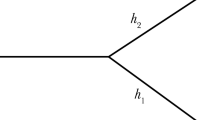Abstract
The paper argues that future knowledge will in substantial measure be inscrutable for us today, with the principal exception of facts about the past. The paper considers the reasons for this circumstance and examines its wider implications for the condition of human knowledge.
Similar content being viewed by others
Notes
That contingent future developments are by nature cognitively intractable, even for God, was a favored theme among the medieval scholastics. On this issue see Adams (1987), chap. 27.
On this theme see Rescher (2000).
As one commentator has wisely written: “But prediction in the field of pure science is another matter. The scientist sets forth over an uncharted sea and the scribe, left behind on the dock is asked what he may find at the other side of the waters. If the scribe knew, the scientist would not have to make his voyage” (Anonymous [1920]).
Quoted in Daedalus, vol. 107 (1978), p. 24.
Whitehead (1969).
See Kuhn (1970), for an interesting development of the normal/revolutionary distinction.
Peirce (1934), sect. 7.144. See also Peirce’s important 1898 paper on “Methods for Attaining Truth,” in ibid., sects. 5.574 ff.
Rescher (1979a) deals with these matters.
Note that this is independent of the question “Would we ever want to do so?” Do we ever want to answer all those predictive questions about ourselves and our environment, or are we more comfortable in the condition in which “ignorance is bliss”?
See Jeffrey (1940).
References
Adams MMC (1987) William Ockham, vol II. University of Notre Dame Press, Notre Dame
Anonymous (1920) The future as suggested by developments of the past seventy-five years. Sci Am 123:321
Badash L (1972) The completeness of nineteenth-century science. Isis 63:48–58
Feynmann R (1965) The character of physical law. MIT Press, Cambridge
Harré R (1970) Principles of scientific thinking. University of Chicago Press, Chicago
Hawkins SW (1981) Is the end in sight for theoretical physics? Phys Bull 32:15–17
Jeffrey E (1940) Nothing left to invent. J Pat Off Soc 22:479–481
Kuhn T (1970) The structure of scientific revolution, 2nd edn. University of Chicago Press, Chicago
McKinnon E (ed) (1972) The problem of scientific realism. Appleton-Century-Crofts, New York
Peirce CS (1934) Collected papers. In: Hartshorne C, Weiss P (eds), vol V Harvard University Press, Cambridge, MA
Rescher N (1977) Methodological pragmatism. Blackwell, Oxford
Rescher N (1979a) Cognitive systematization. Blackwell, Oxford
Rescher N (1979b) Scientific progress. Blackwell, Oxford
Rescher N (2000) Kant and the reach of reason: studies in Kant’s theory of rational systematization. Cambridge University Press, Cambridge
Sellars W (1963) Science perception and reality. Humanities Press, London
Stent G (1969) The coming of the golden age. Natural History Press, Garden City
Suppe F (ed) (1977) The structure of scientific theories, 2nd edn. University of Illinois Press, Urbana
Whitehead AN (1969) In: Ziman J (ed) Reliable knowledge. Cambridge University Press, Cambridge, pp 142–143
Author information
Authors and Affiliations
Corresponding author
Rights and permissions
About this article
Cite this article
Rescher, N. The problem of future knowledge. Mind Soc 11, 149–163 (2012). https://doi.org/10.1007/s11299-012-0099-8
Received:
Accepted:
Published:
Issue Date:
DOI: https://doi.org/10.1007/s11299-012-0099-8




